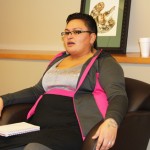
By Jeannie Briones and Kim Kalliber
Poet enthusiasts gathered at the Tulalip Hibulb Cultural Center on March 7th to listen to guest poet, Raven Hunter. Her bold and truthful poetry drew the audience into her introspection of love, loss, and pain.
“There is nothing else in the world more intimidating, and yet so fulfilling, than the truth. When you tell the truth, it doesn’t matter who denies it or who accepts it. The truth is the truth and these are my truths,” said Hunter, who hopes that through her poetry, people will understand what it’s like to walk in her shoes. “This is how I want to portray my poetry, because it isn’t just poetry, it is my life story.”
Twenty-four year-old Hunter is a Jamestown S‘Kallam Tribal member with a Hispanic background. Growing up in Sunnyside, Washington, a Hispanic agriculture community, her father, grandfather, uncle, and sister helped shape the women she is today.
Raising her siblings forced a young Hunter to grow up fast, and writing became a way for her to cope with the absence of her mother.
“Poetry is a release because I wasn’t allowed to show my emotions as a child. I turned to writing and reading because you can get lost in words; they are endless,” said Hunter.
Hunter enjoyed creating funny skits and short stories, but after reading one of her sister’s poems about looking outside of yourself and caring for others, she became inspired to write her own poetry. She wrote about a boy and a friend caught a love triangle. At the age of 14, Hunter began sorting through a tangle of deep emotions through writing.
“Some people cry, some people cut themselves, some people turn to drugs, some people turn to God, and I turn to truth,” said Hunter.
Now in 2013, having suffered through the loss of loved ones and a recent break-up, Hunter has reached a point in her life where she feels it’s important to discover who she really is.
“I have been lost for so long and now I have the chance to be found, and it intimidates me,” said Hunter
Her love of nature developed into an interest in ethnobotany, the study of culture and plants and the relationship that exists between them. “I have always known I’m supposed to be a healing person, as early as I can remember,” said Hunter.
Through her written work, she hopes someday, when she has children, they can look back and see that they can overcome life’s struggles and be a survivor.
“I was thinking what I want my legacy to be; I want to give something to my children so when I’m on my death bed, I can say that I gave something that was worth giving to them, that is not of this material world,” said Hunter.
For more information on future poetry series or other series at the Tulalip Hibulb Cultural Center, please call 360-716-2600 or visit www.hibulbculturalcenter.org.
